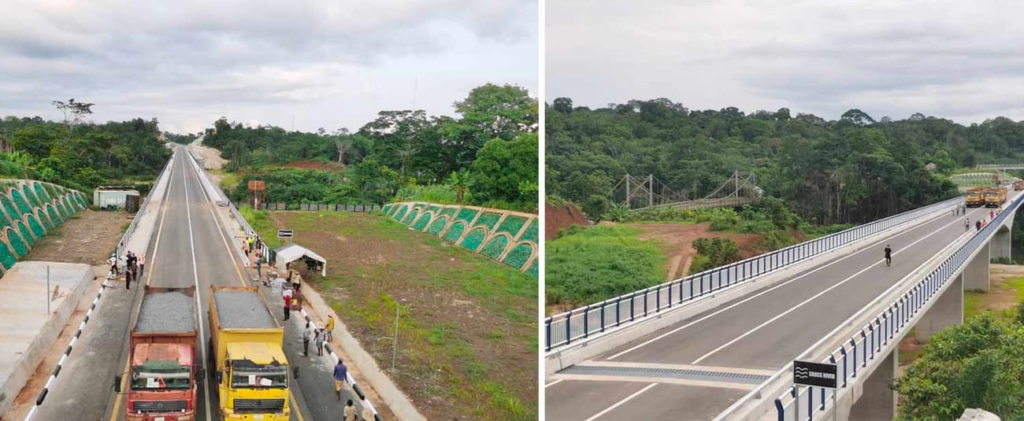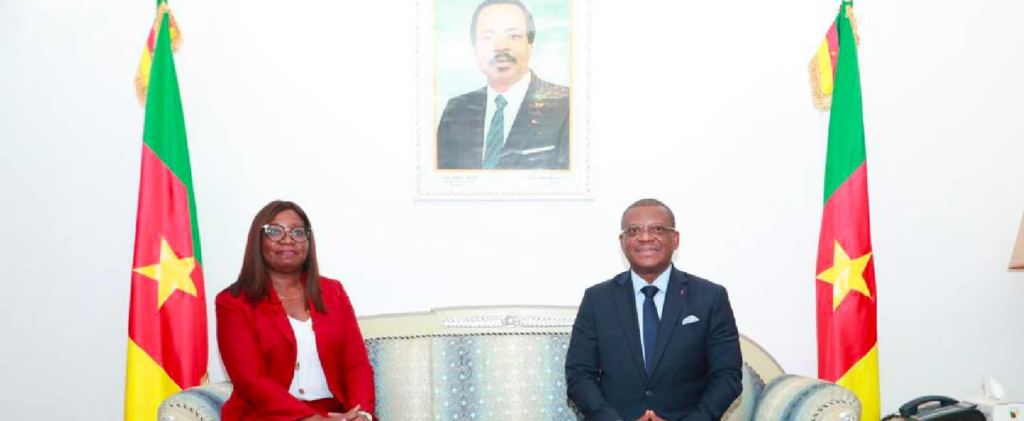
YAOUNDE, Cameroon, 25 April 2024 -/African Media Agency(AMA)/-In an era of transformative development, the African Development Bank Group stands as a beacon of progress in Central Africa, particularly in Cameroon, where the institution has earmarked more than 50 percent of its portfolio for funding transport infrastructure.
The Bank spearheaded crucial projects such as the Ketta-Djoum Road, linking Cameroon to Congo, for which it invested $173 million. It has also contributed to connecting Cameroon to Nigeria by providing $120 million for the construction of the Bamenda-Enugu Road and the Cross River border bridge. The bridge formally opened to traffic in October 2022.

The construction of a bridge over the Logone River, funded to the tune of $115 million, is underway to link northern Cameroon with Chad. In addition, the Bank last year approved $80 million for the construction of a bridge over River Ntem to connect Cameroon and Equatorial Guinea.
Establishing transport links between Cameroon and its neighbors, namely Congo, Chad, Nigeria and Gabon, through the construction of cross-border roads and bridges, facilitates regional integration. These projects have generated more than 2.5 million direct jobs, 40 percent of them held by women, enhanced the efficiency of the transport logistics chain along travel corridors, and improved communities’ access to basic services.
Alamine Ousmane Mey, Cameroon’s Minister of Economy, Planning and Regional Development and the Bank’s Governor for Cameroon, lauded the Bank’s engagement in the country, saying its interventions are “radically changing the face of the region.”
During her recent visit to the Cameroonian capital, Yaounde, Marie-Laure Akin-Olugbade, the Bank Group’s Vice-President for Regional Development, Integration and Business Delivery, received accolades from various government officials for the Bank’s transformative contributions.
In Yaoundé, Akin-Olugbade led the inauguration of the Bank Group’s regional office for Central Africa, reaffirming the institution’s commitment to the region’s development course. She also met with Prime Minister Joseph Dion Ngute, Finance Minister Louis-Paul Motaze, and Emmanuel Nganou Djoumessi, Minister of Public Works.

Prime Minister Ngute, who presided over the office inauguration event, praised the “true worth” of the Bank’s support for integration projects in Central Africa.
In 2011, the Bank provided $60 million in financial and technical support for the construction of the Lom Pangar and Nachtigal dams. The hydroelectric dam injected 1153 GWh into the interconnected grid in southern Cameroon, providing over 100,000 additional households with access to electricity.
The Bank is the only development institution that continues to operate intensively in Cameroon’s Far North, Northwest and Southwest regions, which have been plagued by security challenges. These regions and the East remain the Bank’s priorities in Cameroon for the next five years.
The Bank’s projects include the:
- Cameroon-Chad Power Interconnection Project, with funding totaling $240.86 million.
- Territorial Development Project for the Far North Region, with funding amounting to $215.80 million.
- Study and Preparation of a Drinking Water Supply and Sanitation Programme, funded with $5.72 million.
- Ring Road Project, backed by funding totaling $241.60 million.
- Lake Chad Basin Regional Road Network Integration Project, funded with $48.80 million.
- Program for Integrated Development and Climate Change Adaptation in the Niger Basin, supported by $9 million in funding.
On the sidelines of the regional office inauguration ceremony, the Bank Group signed a €203 million financing agreement with the Cameroon government for the Territorial Development and Private Sector Promotion Project in the Far North Region. This project, which will benefit more than four million people, will foster regional development, improve the transport system, and promote private sector growth, with the potential to develop a sustainable and integrated development hub in the Far North Region.
That region serves as a buffer zone between the Sahel and Central Africa and is a veritable sub-regional crossroads between three of the four countries in the Lake Chad Basin (Cameroon, Nigeria and Chad), plagued by crises that are distinct but closely related.
Reflecting on the significance of the partnership, Public Works Minister Djoumessi, hailed the Bank as a crucial ally aligned with Cameroon strategic needs, a sentiment echoed by Finance Minister Motaze, underscoring the transformative impact of the Bank’s initiatives on local communities.
“We aim to be bolder, move faster, and increase the efficacy of our operations in Cameroon because people’s lives are at stake,” said Akin-Olugbade, indicating that the Bank Group could double the country portfolio within the next five years.”
During their engagement, the Bank Vice-President and the government representatives evaluated the Bank’s portfolio for Cameroon, which comprised 26 projects as of 1 April 2024, involving commitments of approximately $2.5 billion. The primary areas of focus are transport (56.5 percent), energy (20.4 percent), and agriculture (10.5 percent).
The Vice-President also held a meeting of the “Big 5”, a platform that coordinates the actions of Cameroon’s principal technical and financial partners, comprising the African Development Bank, the French Development Agency, the World Bank, the International Monetary Fund and the European Union. Their dialogue focused on structural socio-economic reforms and finding ways to improve the effectiveness of investment projects within the country.
Distributed byAfrican Media Agency on behalf of African Development Bank
The post Cameroon: The African Development Bank, a leading infrastructure partner appeared first on African Media Agency.





